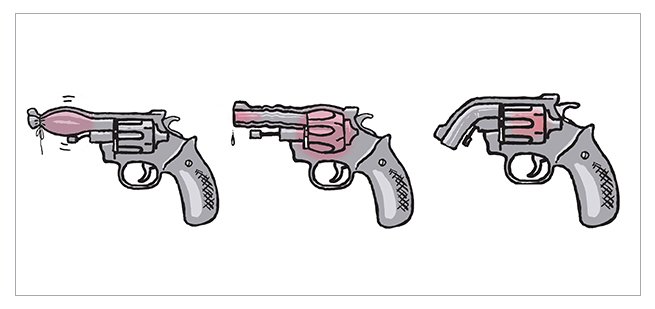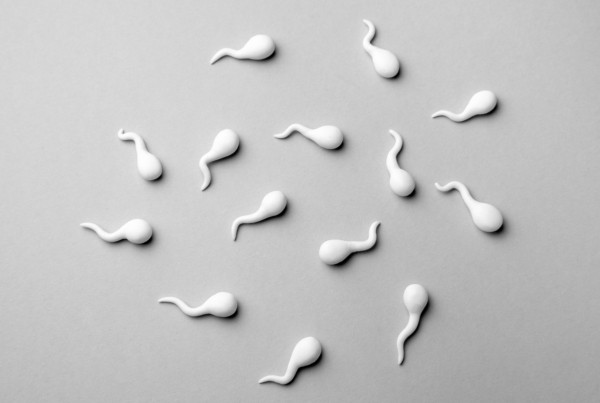Many men experience sexual dysfunction of some kind in their life. Contrary to popular belief, erectile dysfunction and low libido are not the only problems that have an impact on sexual well-being. Ejaculatory control and function are also common hiccups that men routinely face in their sex life. The stigma of “not being virile” can both impact a man’s relationship and cause him to suffer in silence. So, let’s address this subject openly….
What is ejaculation?
An ejaculation is a central nervous system reflex action that cannot be voluntarily controlled or interrupted. At the peak of a man’s sexual stimulation, his pelvic muscles contract as the brain sends signals to the penis. Rhythmic contractions of the muscles around the urethra then cause a release of semen from the tip of the penis at orgasm. This is known as ejaculation.
Major ejaculatory dysfunctions
#1 Delayed ejaculation
What is it? About 8% of men are affected by this condition in which men can achieve an erection but are unable to ejaculate in a reasonable amount of time (a few minutes) and can sometimes delay up to an hour. Delayed ejaculation can be a two-fold problem, sometimes encompassing both the inability to ejaculate at all and to reach an orgasm, resulting in a feeling of lack of ‘completion’ when engaging in sexual intercourse.
Causes:
- Physical or psychological factors such as anxiety, fear of intimacy, early sexual trauma, relationship problems, and depression can impact this condition.
- It is a complex sexual disorder involving the brain and the nervous system.
- Anti-depressants and anti-smoking medication are also known to impact the neurotransmitters in the brain resulting in delayed ejaculation.
Treatment: A urologist can help by reviewing medical/sexual history to determine the cause of the problem and to rule out problems such as diabetes, thyroid dysfunction and investigate testosterone levels. Questions concerning the use of medications that can impact sex drive such as anti-depressants, anti-smoking or muscle relaxants may be asked.
#2 Premature ejaculation
What is it? Approximately 120 million men in the U.S. suffer from premature ejaculation, a sexual disorder that occurs when a man reaches orgasm and ejaculates too quickly (within a minute or less) or even before penetration can be achieved.
Probable Causes:
- Physical issues such as prostate, diabetes, thyroid and spinal cord problems
- Psychological issues such as stress, depression or anxiety (about maintaining an erection, leading to overstimulation and early ejaculation).
- Biological issues (such as organ extra-sensitivity).
Treatment: It is recommended to seek medical help if this condition impacts the couple’s sex life and the man’s self-esteem. According to Johns Hopkins Medicine, premature ejaculation may not always be a permanent condition. In some cases, it is spontaneously resolved when emotional or psychological triggers are identified and treated.
Behavioural therapy is known to positively impact 60 to 90% of cases. As an example, the ‘squeeze’ technique can effectively work to delay ejaculation.
As a last resort, prescription drugs can delay ejaculation for several minutes. Selective serotonin reuptake inhibitors (SSRIs) such as fluoxetine (Prozac) and paroxetine (Paxil) are some important anti-depressants that can aid in delaying ejaculation. The drugs Sildenafil (Viagra) or vardenafil (Levitra) may also benefit men suffering from premature ejaculation.
# 3 Retrograde ejaculation
What is it? Retrograde ejaculation, or ‘dry orgasm’ is diagnosed when a man has an erection and orgasm but produces a negligible amount to ‘zero’ semen during ejaculation. Though retrograde ejaculation is not viewed as a harmful medical condition, it does affect male fertility.
Causes: This occurs because the smooth muscle in the bladder does not contract, making the semen travel backwards into the bladder instead of out through the penis. Men with this sexual dysfunction complain that their urine is cloudy after orgasm. This is due to the presence of semen in the urine.
Retrograde ejaculation can result following bladder or prostate surgery and radiation therapy. Serious illness such as multiple sclerosis, Parkinson’s disease and nerve damage due to diabetes can also cause retrograde ejaculation.
Treatment:
- A urologist should be consulted if a sudden change in urine colour (cloudy texture) and the complete absence of semen in the ejaculate is noted so that the urologist can conduct a thorough physical exam investigating the presence of semen in the urine.
- Prescription drugs such as Pseudoephedrine, a commonly used decongestant has proved effective in treating retrograde ejaculation triggered primarily by diabetes or surgery.
- If retrograde ejaculation has led to infertility, sperm from the patient’s urine can be extracted for artificial insemination and IVF. In addition, procedures such as Testicular Sperm Aspiration (TESA) and Percutaneous epididymal sperm aspiration (PESA) may also be an option.
#4 Anejaculation
What is it? Anejaculation is a condition in which semen is not released and there is no production of fluid during orgasm. However, unlike retrograde ejaculation, no sperm is released into the urine either.
Causes:
- A dysfunctional prostate, neurological disorders, Parkinson’s, severe spinal cord injuries or infection in the pelvic area
- In Situational Anejaculation, ejaculation is normal only in certain circumstances.
- In Total Anejaculation, difficulty ejaculating under any circumstances. This is further subdivided into anorgasmic or orgasmic.
- Anorgasmic: The man can ejaculate and achieve orgasm only when he is asleep.
- Orgasmic: Orgasim is achieved without ejaculation. Causes for this could be tubal blockage, damaged nerves and even retrograde ejaculation.
Treatment:
- Drug therapy: Ephedrine and imipramine
- Psychosexual counselling for couples
- Electrostimulation (spinal cord injury)







